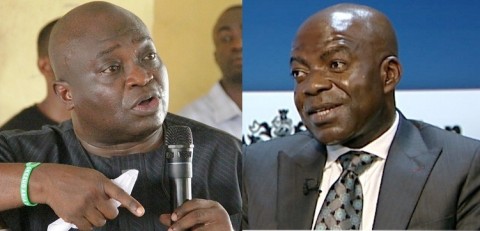OPINION: Still on Abia Appeal Court Ruling
Articles/Opinion, Featured, Latest Headlines Monday, January 11th, 2016
By Chinedu Ekeke
BALTIMORE, MD (AFRICAN EXAMINER) – I have read the judgement of the learned justices of the Appeal Court and can confirm that it is flawless. But the rented protesters, including those who contracted them, hadn’t read a line of the judgement they were protesting. One then wonders why a people who have the option of appealing at the Supreme Court will take to intimidation and blackmail. Do they intend to instigate violence as a tool to sway the justices of the Supreme Court to their cause?
For the avoidance of doubt, let me summarise the reason for the judgment. The Appeal Court’s argument is that INEC, which was defending its declaration of Ikpeazu as Abia governor in the suit, was the same body which presented to the Election Petition Tribunal with evidence of accreditation in the election.
The INEC official who was subpoenaed by the tribunal said the accreditation report she brought was conclusive, and that every accreditation that took place in that election was captured in that document. When this witness said these, Ikpeazu’s lawyers did not cross-examine her to fault her claim.
And in law, once you don’t fault a witnesses’ claim with cross-examination, you have agreed with her testimony. It was based on that evidence which Ikpeazu’s lawyers acquiesced to with their silence that the Appeal Court judges established a case of over-voting in some areas in the election.
Now, here are the figures. Accreditation in those areas, according to INEC accreditation report was 93,369.
Number of votes from those areas was 160,252.
The unanswered question then became how 93,369 people manufactured 160,252 votes. It was evident that people sat in their living rooms and manufactured election results and then allocated votes to candidates as they wished.
Because voting can only be exercised by those who went through accreditation, the learned justices determined that the results from those areas were concocted, fictitious and fabricated. The votes are unlawful. And our laws have it settled, that when over-voting is established, the election is nullified and voided. A null and void action is without validity, it lacks force of law.
As at the time the election held, it had already produced a clear winner in Alex Otti. The learned justices then held that there would only be a need to call for a rerun if there was no clear winner. Alex Otti met the constitutionally required 25% of votes cast in two-third local governments of the state, as well as garnered majority of votes cast.
In all the noise I’ve heard from the custodians of a stolen mandate and their cheerleaders, none has boasted of having won the April election. Listen to the arguments, they all have implicitly owned up to having rigged. And rather than plead that we don’t jail them, they are pushing for a rerun, as if robbing Abians of their mandate wasn’t bad enough.
Although their arguments have majorly come off as incoherent, yet I’ll try to interrogate some of the falsehood they’ve been selling to the world:
That the cancellation of the lawful results will be a disenfranchisement to voters in those parts of the state. Well, every declaration on election matters by any court or even INEC disenfranchises people. There’s no way every registered voter will vote in an election.
The declaration of the appellate court was to achieve punitive ends. It was meant to discourage election rigging in the future as declaring a rerun will empower a vote rigger who, having stolen another man’s mandate and having used same to appropriate the state’s resources, now seeks to benefit from his robbery.
Aware that he was never the winner of the election and knowing there’s a chance the courts will sack him, a beneficiary of electoral theft would naturally go populist, while his lawyers at the same time labour to lure the courts into conceding him a rerun. That is the game of Abia PDP which all lovers of justice should condemn.
That the disenfranchised people in those areas are over 350,000 in number. This is laughable, because first, I heard Mr A.C.B Agbazuere, the state’s Commissioner for Information say on Channels TV that the number of disenfranchised people was 200,000; later Charles Ajunwa, former S.A. to immediate past governor T.A.Orji published in This Day newspaper that the disenfranchised people were over 150,000.
Finally I heard Eziuche Ubani, another Commissioner in the state claim on Ray Power that the number being disenfranchised was 350,000. For them, depending on the speaker’s level of comfort with falsehood, the more the number is exaggerated, the more they stand a chance of winning public sympathy.
To puncture this claim, we will need to know how many people voted in Abia during the 2015 presidential election. First, all core Igbo states were hugely supportive of President Goodluck Jonathan. Secondly, his wife, Patience grew up in Umuahia since her own mother hailed from there.
It therefore stands to reason that Abians came out en masse to give Jonathan their votes; yet he got only 368,303 votes while Muhammadu Buhari got 13, 394. The total was about 381,700 votes. This is the true voting strength of Abia state, not the over-bloated pre-Card Reader figures bandied around by Abia PDP.
Now, Abia has 17 Local Governments. If Only 3 local governments have more than 350,000 votes as the PDP claims, where was the votes from the rest 14 local governments including Aba North and South, Ohafia and Bende all of which have the highest voting strength? How come President Jonathan, in spite of the love Abians have for him, could only poll 368, 303 votes? You see, no matter how fast falsehood sprints, truth will overtake it at a point.
That accreditation of voters was not with Card Reader alone. This argument was advanced by the noisy lawyer, Mike Ozekhome, in a bid to flaw the appeal court judgement. It is not certain that Mr Ozekhome was on earth when the governorship elections held in Nigeria. If he were here, he wouldn’t have boldly made that statement on national television without any scruples.
I will assume the lawyer was out in space exploring novel areas in electoral jurisprudence when INEC issued a guideline for the governorship elections, insisting that ONLY card readers would be used for accreditation. INEC went further to insist that if any card reader failed at any polling unit, the device would be replaced, and if the replaced one failed again, the election would be postponed to the next day so another card reader would be brought for accreditation.
That way, INEC made it impossible for anybody to write fake results under the guise of card readers not functioning well. It is worth repeating to Mike Ozekhome that INEC gave no room for manual accreditation.
So it is evident that the learned justices of the appellate court were right to decide the matter on the strength of the evidence by INEC which gave the concluded accreditation figures in the areas where unlawful votes were exorcised.
That the justices of the Appeal Court should have called for a rerun. Of course, Alex Otti will win Okezie Ikpeazu any day in Abia state, but does it serve the course of justice that someone who won election be made to go through another round of elections while the person who stole his mandate is allowed to benefit from his crime? At what point do we as a society put a stop to incentivizing crimes?
In any case, the learned justices of the appeal court unanimously stated that ‘’ordering a fresh election will only arise where a clear winner did not emerge after the deduction of the illegal votes.’’
There was a clear winner, and he should be allowed to exercise his mandate. Those who disagree with the judgement should face the court, not the streets.
Related Posts
Short URL: https://www.africanexaminer.com/?p=29337






















